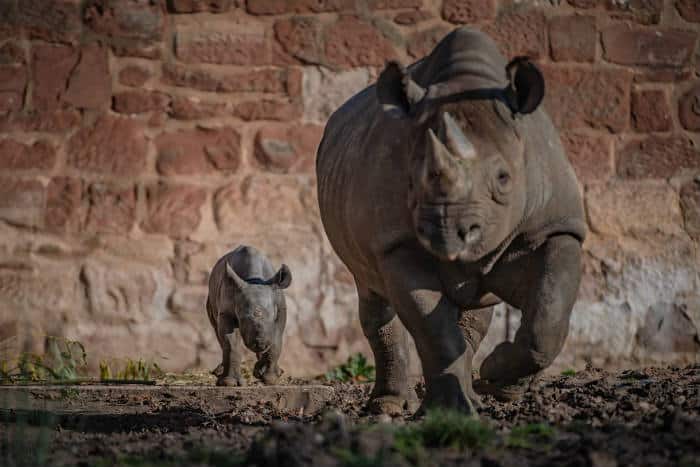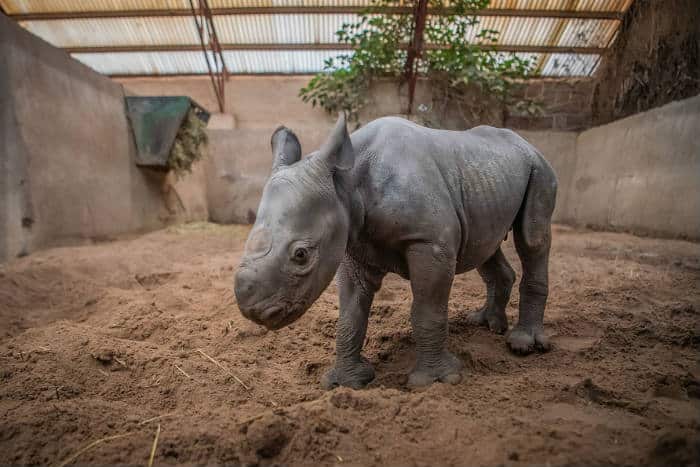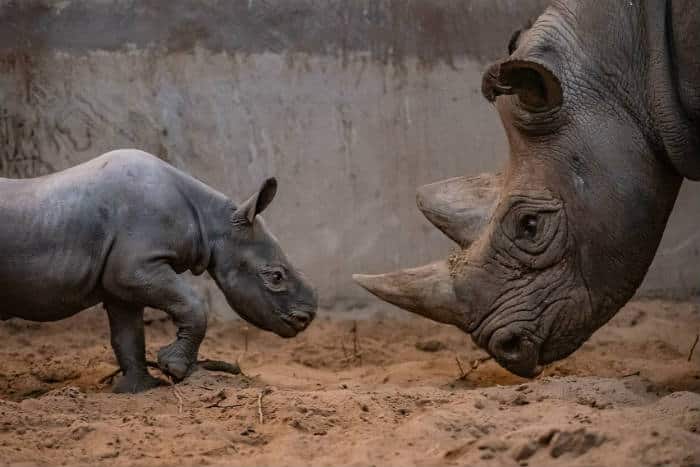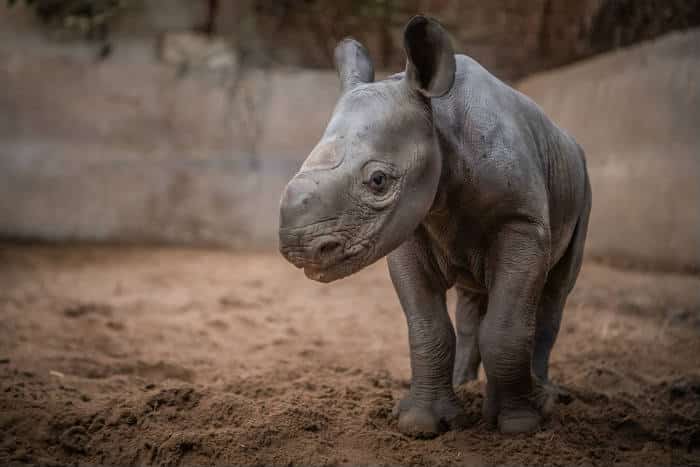A rare baby rhino has been born at Chester Zoo
- Written by Louise Rhind-Tutt
- Last updated 4 years ago
- Attractions, Cheshire

Following the recent birth of a critically endangered Bornean orangutan, zookeepers at Chester Zoo are now celebrating the birth of a rare baby rhino.
The female calf was safely delivered by new mum Ema Elsa on Thursday 29th October, following a 15-month-long pregnancy.
The birth was caught on the zoo’s CCTV cameras, and shows the little one up on her feet and suckling from mum just 10 minutes later.
Now, the zoo has launched a poll on its Facebook page, inviting the public to help name the precious new arrival.

Keepers have shortlisted the names Kasulu (a town in Tanzania), Koshi (meaning ‘to try’) and Kaari (meaning ‘young girl/young daughter’) for voters to choose from.
Conservationists at the zoo say the arrival of the calf – an eastern black rhino – will be ‘celebrated globally’ as fewer than 1000 now remain on the planet.
“The birth of a critically endangered eastern black rhino is always very special,” said Andrew McKenzie, team manager of rhinos at the zoo.
“And to be able to watch on camera as a calf is born is an incredible privilege – with rhino numbers so, so low it, sadly, isn’t something that’s captured very often.
“Seeing the little one then get to her feet with a gentle nudge from mum; take her first tentative steps and suckle for the first time is then the icing on the cake.
“It really is heart-warming stuff. The whole team here is overjoyed.

“Mum and calf have bonded wonderfully and have been showing us all of the right signs.
“These rhinos have been pushed to the very edge of existence and every single addition to the European endangered species breeding programme is celebrated globally.
“It’s sadly no exaggeration to say that it’s entirely possible that we could lose them forever within our lifetime and the world’s most progressive zoos are very much part of the fight to prevent their extinction.”

The eastern black rhino is listed by the International Union for the Conservation of Nature (IUCN) as critically endangered.
In the wild, they are now found only in Kenya, Tanzania and Rwanda.
Experts say the multibillion pound illegal wildlife trade is driving the species towards extinction – the surge in demand of rhino horn stemming from the Asian medicine market.
“In the short term, Ema Elsa and her new baby will help to highlight the perilous position that this species is in and we hope they encourage more people to join the fight to prevent the extinction of these gentle giants,” said Andrew.
“In the future, as we work to ensure more safe areas, we hope Ema and her offspring, like others before them born into the European breeding programme, are one day able to make the journey back to Africa.”
- This article was last updated 4 years ago.
- It was first published on 16 November 2020 and is subject to be updated from time to time. Please refresh or return to see the latest version.
Did we miss something? Let us know: [email protected]
Want to be the first to receive all the latest news stories, what’s on and events from the heart of Manchester? Sign up here.
Manchester is a successful city, but many people suffer. I Love Manchester helps raise awareness and funds to help improve the lives and prospects of people across Greater Manchester – and we can’t do it without your help. So please support us with what you can so we can continue to spread the love. Thank you in advance!
An email you’ll love. Subscribe to our newsletter to get the latest news stories delivered direct to your inbox.
Got a story worth sharing?
What’s the story? We are all ears when it comes to positive news and inspiring stories. You can send story ideas to [email protected]
While we can’t guarantee to publish everything, we will always consider any enquiry or idea that promotes:
- Independent new openings
- Human interest
- Not-for-profit organisations
- Community Interest Companies (CiCs) and projects
- Charities and charitable initiatives
- Affordability and offers saving people over 20%
For anything else, don’t hesitate to get in touch with us about advertorials (from £350+VAT) and advertising opportunities: [email protected]

Fast, fierce and unmissable: Manchester Thunder are bringing Netball like you’ve never seen it before!


Review: Girl on the Train at LOWRY is a’ tour de force in psychological drama’

Where the Michelin Guide recommends to eat in Manchester


















